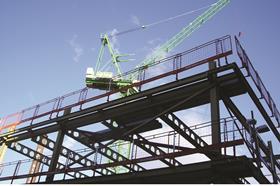UKCGŌĆÖs campaign to boost construction spending comes amid dire economic news

The construction industry came together this week to back calls for the government to act urgently to boost investment in construction projects, amid further alarming signs of deterioration across the sector and the wider economy.
A host of key industry bodies have united to support the UK Contractors GroupŌĆÖs (UKCG) Creating BritainŌĆÖs Future campaign, launched last week. The campaign underlines how investment in construction should be used to return Britain to economic growth, highlighting the fact that every ┬Ż1 invested in construction generates ┬Ż2.84 of GDP, as well as promoting employment, boosting skills and improving the UKŌĆÖs long-term competitiveness.
Responding to a call from ║├╔½Ž╚╔·TV for other professions and representative bodies to lend their support to the UKCG campaign, this week the RICS, the RIBA, the Home Builders Federation, the Civil Engineering Contractors Association, the National Specialist ContractorsŌĆÖ Council, the Federation of Master Builders (FMB) and the National Federation of Builders all threw their weight behind the initiative.
They joined the CBI, which last week backed the campaign, with CBI director general John Cridland attacking the governmentŌĆÖs lack of progress on its growth plan and accusing ministers of being ŌĆ£dazzled in the headlightsŌĆØ.
Jack Pringle, chair of the Construction Industry Council, also backed the campaign, but said it was ŌĆ£a pityŌĆØ that other industry bodies had not been invited to take part in the launch. He said the absence of ministers from the launch ŌĆ£underlines the importance of the entire construction industry getting together so the government knows who to listen toŌĆØ.
UKCG chief executive Stephen Ratcliffe welcomed the support from across the sector. ŌĆ£The more people that get on the bandwagon the better - the industry needs an effective voice,ŌĆØ he said.
The support for the campaign came amid further signs of deterioration across the sector.
Last week the Office for National StatisticsŌĆÖ latest construction output figures showed total output for May fell 6.3% compared with the previous year.
Analysts predicted the fall in output would keep overall economic growth in negative territory in the second quarter leaving the UK in recession. This week the IMF slashed its UK growth forecast for this year to just 0.2%, against the 0.8% it had predicted in the spring and the 2.3% it predicted last summer.
In other worrying signs:
- the FMBŌĆÖs latest State of Trade survey found a third of SMEs were shedding labour as workloads continued to decline
- a Constructionline survey found that one in four public sector clients are set to cancel projects over the next six months, with a further quarter to ask their supply chain to slash prices
- the latest RICS Construction Market Survey found that infrastructure workloads were flat during the three months to June (below).
This week the government announced ┬Ż4.2bn of investment in BritainŌĆÖs rail infrastructure from 2014-2019, as well as an infrastructure investment guarantee scheme (see ).
However, critics said the moves, while welcome, fell short of what was needed to boost construction.
Simon Rawlinson, EC Harris head of strategic research and insight, said that major infrastructure programmes were more about ŌĆ£jam tomorrowŌĆØ. ŌĆ£These programmes canŌĆÖt provide the shovel-ready projects that the industry needs to move out of its current slowdown ,ŌĆØ he said.
LabourŌĆÖs shadow construction minister Iain Wright said the government ŌĆ£doesnŌĆÖt really see the construction sector as a priorityŌĆØ.
ŌĆ£Construction should be part of the solution,ŌĆØ he said.
Investment in construction must be a priority

Mark Walley, RICS executive director, UK
The findings of our Q2 2012 Construction Market Survey support the issues highlighted by the UKCGŌĆÖs Creating BritainŌĆÖs Future campaign and underline concerns about the lack of government action on infrastructure.
The survey shows infrastructure workloads to be flat during the period, with little movement evident in the sector since the end of 2009.
The government clearly needs to leverage private finance, but there is a worrying absence of discernible appetite from pension funds.
We would suggest this is due both to the lack of clarity in government policy, but also a shortage of infrastructure data, which makes it virtually impossible for investors to balance risk and make robust decisions.
The use of our recently launched New Rules of Measurement is helping to standardise cost data and facilitate regular benchmarking with a view to delivering cost savings in the construction sector.
RICSŌĆÖ goal in the medium term is to extend these standards to include infrastructure. We are ready to work with the government and the industry to start delivering these efficiencies.
This will give investors the confidence they need and provide value for money for the taxpayer - paving the way for infrastructure projects to get off the ground.
Why we support UKCGŌĆÖs Creating BritainŌĆÖs Future campaignŌĆ”
ŌĆ£We have an acute housing crisis in this country and have been urging government to invest in addressing this for social and economic reasons. Every house built creates
1.5 full-time jobs and many more in the supply chain, so investment to increase supply makes clear economic sense.ŌĆØ
Stewart Baseley, Home Builders Federation executive chairman
ŌĆ£The quality of the buildings and green spaces that architects, together with the rest of the construction industry, have delivered for the Olympic venues is something to be proud of. Now with the world watching, the strength of our skills is on show and the important role of construction for the UK economy is clear to see in demonstrating the case for investment and good design.ŌĆØ
Angela Brady, RIBA president
ŌĆ£We fully support all efforts for the industry to work together to champion the case for investment in infrastructure that will boost growth in the UK economy.
This campaign is a vehicle for the whole industry to make its case to government and the wider public.ŌĆØ
Alasdair Reisner, Civil Engineering Contractors Association director of external affairs
ŌĆ£Not only does construction generate jobs and growth, but it creates a lasting legacy, through the skills it can teach young people and in the hospitals, schools, roads and other infrastructure from which every person in Britain can benefit. ThatŌĆÖs why we back the call for investment and itŌĆÖs something the whole industry should support.ŌĆØ
Suzannah Nichol, National Specialist ContractorsŌĆÖ Council chief executive
ŌĆ£The importance of construction to our economic growth is often overlooked. This campaign is a means to highlight the importance of the construction sector to the British economy. By joining together, the construction sector is better able to deliver the core messages that we want the government to act on to deliver the much-needed jobs and growth in the economy.ŌĆØ
Brian Berry, Federation of Master Builders chief executive
ŌĆ£Investment in infrastructure and building is vital as any turnaround in the economy will only come with renewed growth. We should not forget that aside from the larger companies, the real threat is to the thousands of SMEs in the supply chain which make up 90% of the sector. These companies are facing a challenge to their very survival due to a drastic loss of work and absence of finance.ŌĆØ
Julia Evans, National Federation of Builders chief executive



























No comments yet